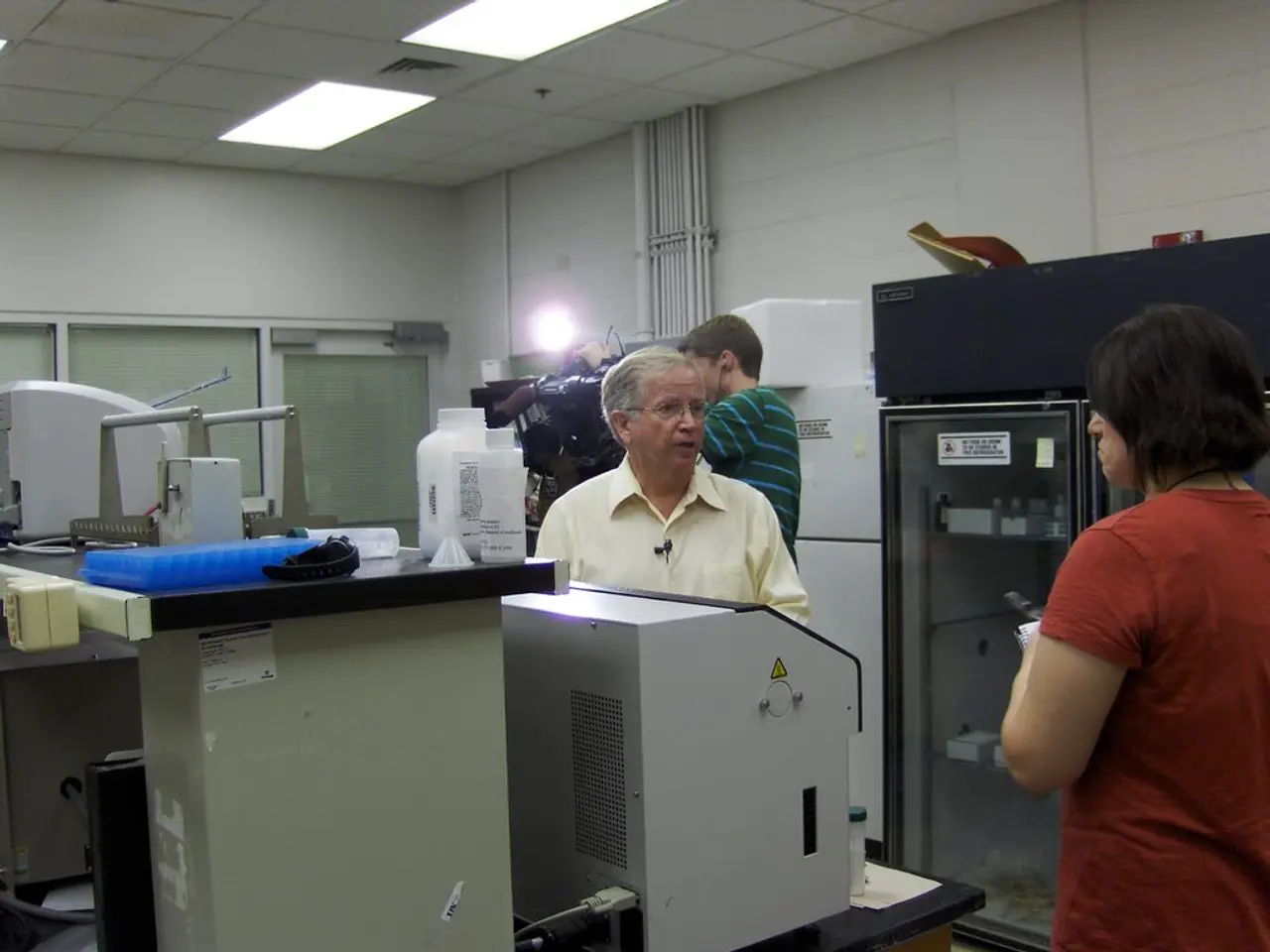Meta Hires ChatGPT Co-Creator Shengjia Zhao to Head Superintelligence Research Division
The AI industry in 2025 is a hotbed of fierce competition, particularly in the race for top AI talent. This competition has a significant impact on leading companies such as Meta, Google, Microsoft, and OpenAI.
Meta's AI Talent Push
Meta, under the leadership of CEO Mark Zuckerberg, is aggressively pursuing AI talent through unprecedented means. The company has established a new "Superintelligence" lab, where it offers massive signing bonuses reportedly up to $100 million and extensive annual compensation to attract star researchers. This strategy includes poaching talent from competitors like OpenAI [2][4].
One of Meta's high-profile hires is Shengjia Zhao, a co-creator of OpenAI's ChatGPT. Zhao will lead Meta's Superintelligence Labs and serve as the chief scientist at Meta's AI research division. The acquisition of Shengjia Zhao and the OpenAI Zurich team is expected to accelerate Meta's advanced AI capabilities and drive innovation across its platforms [1].
OpenAI's Response
OpenAI continues to dominate headlines with its wide range of AI-related hiring, beyond just technical roles, including business, legal, and operational positions. Its top researchers receive compensation packages exceeding $10 million annually, with hefty retention bonuses and equity to prevent defections to rivals or startups like SSI founded by AI luminaries [2][4].
Google and Microsoft's Strategy
While not detailed as aggressively recruiting in the sources, Google and Microsoft remain key players investing heavily in AI advancements. Both companies are known to maintain formidable AI research arms and compete for talent behind the scenes to keep pace with rapid innovations [1][3].
The Talent War
The scarcity of elite AI researchers—those capable of developing and scaling next-generation AI models—is a critical bottleneck. This scarcity has intensified the "talent war," making companies funnel hundreds of millions into acquisition and retention efforts [4].
The stakes are enormous: whoever leads next-generation AI could dominate technology landscapes for decades, fueling not just innovation but corporate valuation and strategic positioning [4].
Industry Trends
AI industry trends for 2025 include autonomous AI systems becoming mainstream in decision-making, embedding AI everywhere, and enhancing reasoning and memory in AI models, pushing companies to continuously upgrade their human capital to innovate [1][3].
Implications for the AI Industry
The Business Insider report serves as a call to action for businesses across various sectors to prioritize AI in their strategic planning. The report suggests that Meta's aggressive AI talent acquisition strategy could prompt other tech giants to follow suit, leading to increased merger and acquisition activity in the AI sector.
The acquisition of Shengjia Zhao and the OpenAI Zurich team by Meta is expected to lead to more personalized user experiences on platforms like Facebook, Instagram, and WhatsApp [1]. The strategic hire and acquisition could reshape the competitive landscape for AI-driven products and services.
In summary, the AI talent war is a defining feature of the 2025 AI industry, with companies like Meta and OpenAI offering extraordinary compensation and strategic initiatives to secure the limited pool of elite AI experts. This competition shapes their capacity to lead AI innovation and product development in a fast-evolving landscape where AI is becoming deeply embedded in daily life and business operations.
[1] Business Insider. (2025, July 26). Meta's $15 billion investment in Scale AI and acquisition of OpenAI Zurich team signals its commitment to AI leadership. Retrieved from https://www.businessinsider.com/meta-invests-15-billion-in-scale-ai-acquires-openai-zurich-team-2025-7-26
[2] The Verge. (2025, July 26). Meta hires Shengjia Zhao, co-creator of OpenAI's ChatGPT, to lead its Superintelligence Labs. Retrieved from https://www.theverge.com/2025/7/26/22648545/meta-hires-shengjia-zhao-openai-chatgpt-superintelligence-labs
[3] Forbes. (2025, July 26). The AI talent war: How companies are competing for the best minds in AI. Retrieved from https://www.forbes.com/sites/bernardmarr/2025/07/26/the-ai-talent-war-how-companies-are-competing-for-the-best-minds-in-ai/?sh=2c6889754b0f
[4] Wired. (2025, July 26). The AI arms race: Why companies are willing to pay top dollar for top AI talent. Retrieved from https://www.wired.com/story/the-ai-arms-race-why-companies-are-willing-to-pay-top-dollar-for-top-ai-talent/
- Meta's aggressive AI talent acquisition strategy, emphasized by the $100 million signing bonuses and extensive annual compensation, aims to drive innovation and growth in its product offerings.
- OpenAI maintains a competitive advantage by offering top AI researchers annual compensation packages exceeding $10 million, with hefty retention bonuses and equity to prevent defections.
- Google and Microsoft remain significant players in the AI industry, investing heavily in AI advancements and vying for top talent to ensure their models remain competitive.
- The scarcity of elite AI researchers has intensified a fierce competition for their services, with companies like Meta, OpenAI, Google, and Microsoft funneling hundreds of millions into acquisition and retention efforts.
- In the AI industry of 2025, autonomous AI systems are becoming mainstream in decision-making, and companies are increasingly embedding AI everywhere to enhance reasoning and memory in their models.
- The Business Insider report underscores the importance of prioritizing AI in strategic planning, particularly in the scaling and development of AI-driven products and services.
- The competition for AI talent shapes the industry's landscape, with leading companies like Meta, OpenAI, Google, and Microsoft vying for top talent to secure their positions as industry leaders in finance, business, and technology.




